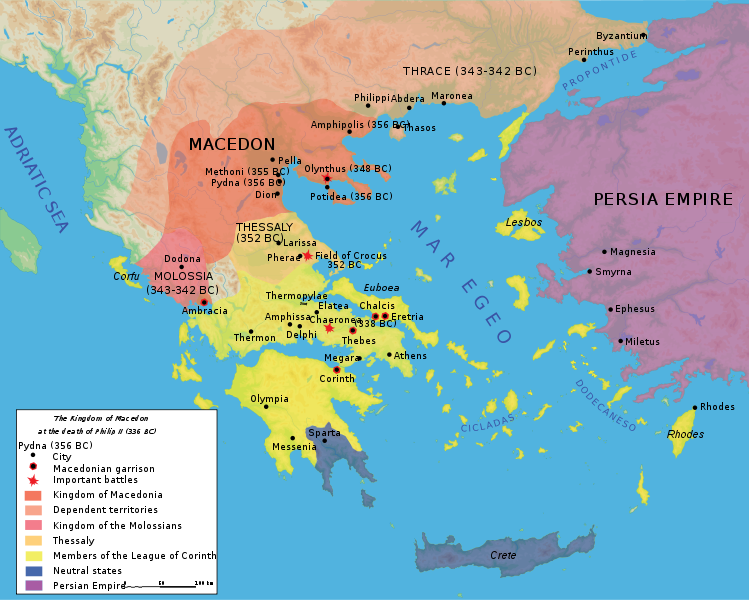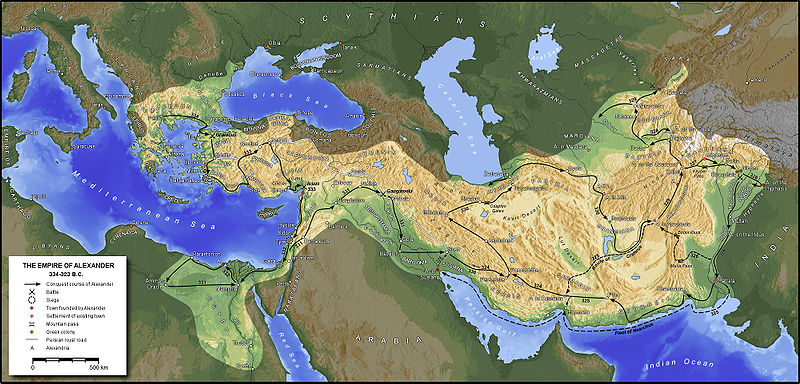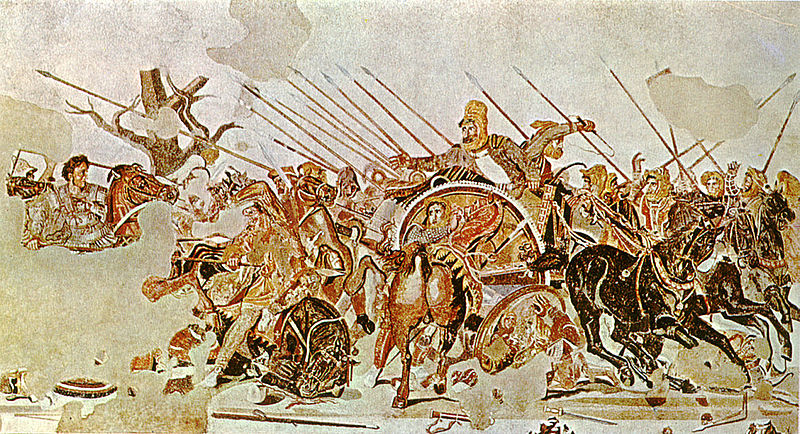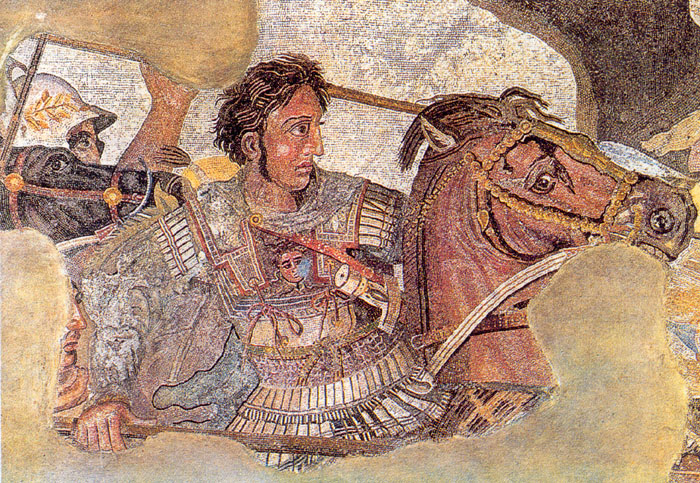<Back to Index>
- Geneticist Gregor Johann Mendel, 1822
- Poet Francesco Petrarca, 1304
- King of Macedon Alexander III, 356 B.C.
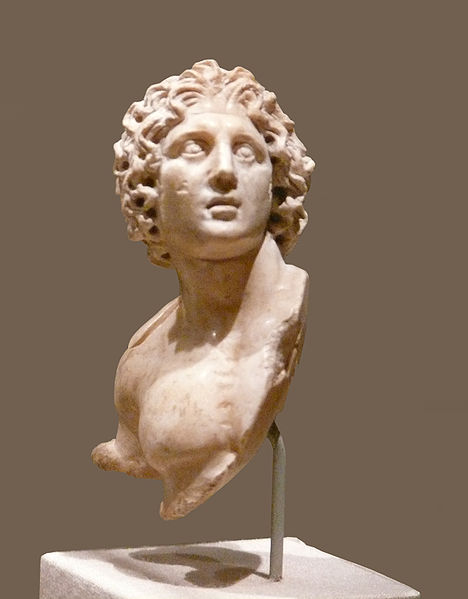
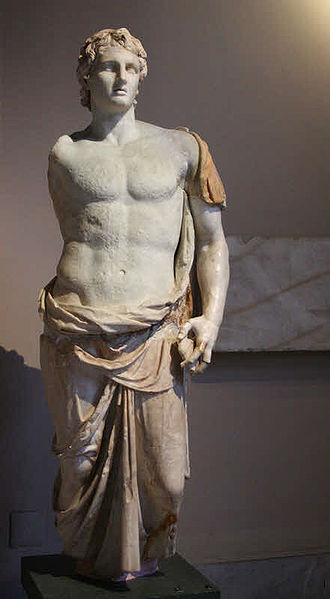
Alexander III of Macedon (356–323 BC), popularly known as Alexander the Great (Greek: Μέγας Ἀλέξανδρος), was a Greek king of Macedon. He is the most celebrated member of the Argead Dynasty and created one of the largest empires in ancient history. Born in Pella in 356 BC, Alexander received a classical Greek education under the tutorship of famed philosopher Aristotle, succeeded his father Philip II of Macedon to the throne in 336 BC after the King was assassinated, and died thirteen years later at the age of 32. Although both Alexander's reign and empire were short-lived, the cultural impact of his conquests lasted for centuries. Alexander is one of the most famous figures of antiquity, and is remembered for his tactical ability, his conquests, and for spreading Greek culture into the East (marking the beginning of Hellenistic civilization).
Philip had brought most of the city-states of mainland Greece under Macedonian hegemony,
using both military and diplomatic means. Upon Philip's death,
Alexander inherited a strong kingdom and an experienced army. He
succeeded in being awarded the generalship of Greece and, with his
authority firmly established, launched the military plans for expansion
left by his father. He invaded Persian-ruled Asia Minor, and began a series of campaigns lasting ten years. Alexander repeatedly defeated the Persians in battle; marched through Syria, Egypt, Mesopotamia, Persia, and Bactria; and in the process he overthrew the Persian king Darius III and conquered the entirety of the Persian Empire. Following his desire to reach the "ends of the world and the Great Outer Sea", he invaded India, but was eventually forced to turn back by the near-mutiny of his troops, who were tired of war. Alexander died in Babylon in 323 BC, before realizing a series of planned campaigns that would have begun with an invasion of Arabia.
In the years following Alexander's death, a series of civil wars tore
his empire apart, which resulted in the formation of a number of states
ruled by Macedonian aristocracy. Remarkable though his conquests were, Alexander's lasting legacy was not his reign, but the cultural diffusion his conquests engendered. Alexander's importation of Greek colonists and culture to the East resulted in a new Hellenistic culture, aspects of which were still evident in the traditions of the Byzantine Empire until the mid-15th century. Alexander became legendary as a classical hero in the mold of Achilles,
and features prominently in the history and myth of Greek and non-Greek
cultures. He became the measure against which generals, even to this
day, compare themselves, and military academies throughout the world still teach his tactical exploits. Alexander was born on 20 (or 21) July 356 BC, in Pella, the capital of the Kingdom of Macedon. He was the son of Philip II, the King of Macedon. His mother was Philip's fourth wife Olympias, the daughter of Neoptolemus I, the king of the northern Greek state of Epirus. Although Philip had either seven or eight wives, Olympias was his principal wife for a time. As a member of the Argead dynasty, Alexander claimed patrilineal descent from Heracles through Caranus of Macedon. From his mother's side and the Aeacids, he claimed descent from Neoptolemus, son of Achilles; Alexander was a second cousin of the celebrated general Pyrrhus of Epirus, who was ranked by Hannibal as, depending on the source, either the best or second-best (after Alexander) commander the world had ever seen. On the day that Alexander was born, Philip was preparing himself for his siege on the city of Potidea on the peninsula of Chalkidiki. On the same day, Philip received news that his general Parmenion had defeated the combined Illyrian and Paeonian armies, and that his horses had won at the Olympic Games. In his early years, Alexander was raised by his nurse, Lanike, the sister of Alexander's future friend and general Cleitus the Black. Later on in his childhood, Alexander was tutored by the strict Leonidas, a relative of his mother, and by Lysimachus. When Alexander was ten years old, a horse trader from Thessaly brought Philip a horse, which he offered to sell for thirteen talents.
The horse refused to be mounted by anyone, and Philip ordered it to be
taken away. Alexander, however, detected the horse's fear of his own
shadow and asked for a turn to tame the horse, which he eventually
managed. According to Plutarch, Philip, overjoyed at this display of
courage and ambition, kissed him tearfully, declaring: "My boy, you
must find a kingdom big enough for your ambitions. Macedon is too small
for you", and bought the horse for him. Alexander would name the horse Bucephalus,
meaning 'ox-head'. Bucephalus would be Alexander's companion throughout
his journeys as far as India. When Bucephalus died (due to old age,
according to Plutarch, for he was already thirty), Alexander named a
city after him (Bucephala). When Alexander was thirteen years old, Philip decided that Alexander needed a higher education, and he began to search for a tutor. Many people were passed over including Isocrates and Speusippus, Plato's successor at the Academy, who offered to resign to take up the post. In the end, Philip offered the job to Aristotle, who accepted, and Philip gave them the Temple of the Nymphs at Mieza as their classroom. In return for teaching Alexander, Philip agreed to rebuild Aristotle's hometown of Stageira,
which Philip had razed, and to repopulate it by buying and freeing the
ex-citizens who were slaves, or pardoning those who were in exile. Mieza was like a boarding school for Alexander and the children of Macedonian nobles, such as Ptolemy, Hephaistion, and Cassander.
Many of the pupils who learned by Alexander's side would become his
friends and future generals, and are often referred to as the
'Companions'. At Mieza, Aristotle educated Alexander and his companions
in medicine, philosophy, morals, religion, logic, and art. From
Aristotle's teaching, Alexander developed a passion for the works of Homer, and in particular the Iliad; Aristotle gave him an annotated copy, which Alexander was to take on his campaigns. When
Alexander became sixteen years old, his tutorship under Aristotle came
to an end. Philip, the king, departed to wage war against Byzantium, and Alexander was left in charge as regent of the kingdom. During Philip's absence, the Thracian Maedi revolted
against Macedonian rule. Alexander responded quickly; he crushed the
Maedi insurgence, driving them from their territory, colonised it with
Greeks, and founded a city named Alexandropolis. After Philip's return from Byzantium, he dispatched Alexander with a small force to subdue certain revolts in southern Thrace. During another campaign against the Greek city of Perinthus, Alexander is reported to have saved his father's life. Meanwhile, the city of Amphissa began to work lands that were sacred to Apollo near Delphi,
a sacrilege that gave Philip the opportunity to further intervene in
the affairs of Greece. Still occupied in Thrace, Philip ordered
Alexander to begin mustering an army for a campaign in Greece. Concerned with the possibility of other Greek states intervening,
Alexander made it look as if he were preparing to attack Illyria
instead. During this turmoil, the Illyrians took the opportunity to
invade Macedonia, but Alexander repelled the invaders. Philip joined Alexander with his army in 338 BC, and they marched south through Thermopylae, which they took after a stubborn resistance from its Theban garrison. They went on to occupy the city of Elatea, a few days march from both Athens and Thebes. Meanwhile, the Athenians, led by Demosthenes,
voted to seek an alliance with Thebes in the war against Macedonia.
Both Athens and Philip sent embassies to try to win Thebes's favour,
with the Athenians eventually succeeding. Philip
marched on Amphissa (theoretically acting on the request of the
Amphicytonic League), captured the mercenaries sent there by
Demosthenes, and accepted the city's surrender. Philip then returned to
Elatea and sent a final offer of peace to Athens and Thebes, which was
rejected. As Philip marched south, he was blocked near Chaeronea, Boeotia by the forces of Athens and Thebes. During the ensuing Battle of Chaeronea,
Philip commanded the right, and Alexander the left wing, accompanied by
a group of Philip's trusted generals. According to the ancient sources,
the two sides fought bitterly for a long time. Philip deliberately
commanded the troops on his right wing to backstep, counting on the
untested Athenian hoplites to follow, thus breaking their line. On the
left, Alexander was the first to break into the Theban lines, followed
by Philip's generals. Having achieved a breach in the enemy's cohesion,
Philip ordered his troops to press forward and quickly routed his
enemy. With the rout of the Athenians, the Thebans were left to fight
alone; surrounded by the victorious enemy, they were crushed. After
the victory at Chaeronea, Philip and Alexander marched unopposed into
the Peloponnese welcomed by all cities; however, when they reached Sparta, they were refused, and they simply left. At Corinth, Philip established a "Hellenic Alliance" (modeled on the old anti-Persian alliance of the Greco-Persian Wars), with the exception of Sparta. Philip was then named Hegemon (often
translated as 'Supreme Commander') of this league (known by modern
historians as the League of Corinth). He then announced his plans for a
war of revenge against the Persian Empire, which he would command. After returning to Pella, Philip fell in love with and married Cleopatra Eurydice, the niece of one of his generals, Attalus.
This marriage made Alexander's position as heir to the throne less
secure, since if Cleopatra Eurydice bore Philip a son, there would be a
fully Macedonian heir, while Alexander was only half Macedonian. During
the wedding banquet, a drunken Attalus made a speech praying to the
gods that the union would produce a legitimate heir to the Macedonian
throne. Alexander shouted to Attalus, "What am I then, a bastard?" and
he threw his goblet at him. Philip, who was also drunk, drew his sword
and advanced towards Alexander before collapsing, leading Alexander to
say, "See there, the man who makes preparations to pass out of Europe
into Asia, overturned in passing from one seat to another." Alexander fled from Macedon taking his mother with him, whom he dropped off with her brother in Dodona,
capital of Epirus. He carried on to Illyria, where he sought refuge
with the Illyrian King and was treated as a guest by the Illyrians,
despite having defeated them in battle a few years before. Alexander
returned to Macedon after six months in exile due to the efforts of a
family friend, Demaratus the Corinthian, who mediated between the two parties. The following year, the Persian satrap (governor) of Caria, Pixodarus, offered the hand of his eldest daughter to Alexander's half-brother, Philip Arrhidaeus.
Olympias and several of Alexander's friends suggested to Alexander that
this move showed that Philip intended to make Arrhidaeus his heir.
Alexander reacted by sending an actor, Thessalus of
Corinth, to tell Pixodarus that he should not offer his daughter's hand
to an illegitimate son, but instead to Alexander. When Philip heard of
this, he scolded Alexander for wishing to marry the daughter of a
Carian. Philip had four of Alexander's friends, Harpalus, Nearchus, Ptolemy and Erigyius exiled, and had the Corinthians bring Thessalus to him in chains.
In 336 BC, whilst at Aegae, attending the wedding of his daughter by Olympias, Cleopatra, to Olympias's brother, Alexander I of Epirus, Philip was assassinated by the captain of his bodyguard, Pausanias. As Pausanias tried to escape, he tripped over a vine and was killed by his pursuers, including two of Alexander's companions, Perdiccas and Leonnatus. Alexander was proclaimed king by the Macedonian army and by the Macedonian noblemen at the age of 20. Alexander began his reign by having his potential rivals to the throne murdered. He had his cousin, the former Amyntas IV, executed, as well as having two Macedonian princes from the region of Lyncestis killed, while a third, Alexander Lyncestes,
was spared. Olympias had Cleopatra Eurydice and her daughter by Philip,
Europa, burned alive. When Alexander found out about this, he was
furious with his mother. Alexander also ordered the murder of Attalus,
who was in command of the advance guard of the army in Asia Minor.
Attalus was at the time in correspondence with Demosthenes, regarding
the possibility of defecting to Athens. Regardless of whether Attalus
actually intended to defect, he had already severely insulted
Alexander, and having just had Attalus's daughter and grandchildren
murdered, Alexander probably felt Attalus was too dangerous to leave
alive. Alexander
spared the life of Arrhidaeus, who was by all accounts mentally
disabled, possibly as a result of poisoning by Olympias.
News
of Philip's death roused many states into revolt, including Thebes,
Athens, Thessaly, and the Thracian tribes to the north of Macedon. When
news of the revolts in Greece reached Alexander, he responded quickly.
Though his advisors advised him to use diplomacy, Alexander mustered
the Macedonian cavalry of 3,000 men and rode south towards Thessaly,
Macedon's neighbor to the south. When he found the Thessalian army
occupying the pass between Mount Olympus and Mount Ossa,
he had the men ride over Mount Ossa. When the Thessalians awoke the
next day, they found Alexander in their rear, and promptly surrendered,
adding their cavalry to Alexander's force, as he rode down towards the
Peloponnesus. Alexander stopped at Thermopylae, where he was recognized as the leader of the Amphictyonic League before
heading south to Corinth. Athens sued for peace and Alexander received
the envoy and pardoned anyone involved with the uprising. At Corinth,
he was given the title Hegemon,
and like Philip, appointed commander of the forthcoming war against
Persia. While at Corinth, he heard the news of the Thracian rising to
the north. Before
crossing to Asia, Alexander wanted to safeguard his northern borders;
and, in the spring of 335 BC, he advanced to suppress several apparent
revolts. Starting from Amphipolis, he first went east into the country
of the "Independent Thracians"; and at Mount Haemus, the Macedonian army attacked and defeated a Thracian army manning the heights. The Macedonians marched on into the country of the Triballi, and proceeded to defeat the Triballian army near the Lyginus river (a tributary of the Danube). Alexander then advanced for three days on to the Danube, encountering the Getae tribe
on the opposite shore. Surprising the Getae by crossing the river at
night, he forced the Getae army to retreat after the first cavalry skirmish, leaving their town to the Macedonian army. News then reached Alexander that Cleitus, King of Illyria, and King Glaukias of the Taulanti were
in open revolt against Macedonian authority. Marching west into
Illyria, Alexander defeated each in turn, forcing Cleitus and Glaukias
to flee with their armies, leaving Alexander's northern frontier secure. While
he was triumphantly campaigning north, the Thebans and Athenians
rebelled once more. Alexander reacted immediately, but, while the other
cities once again hesitated, Thebes decided to resist with the utmost
vigor. However, the resistance was useless, as the city was razed to
the ground amid great bloodshed, and its territory was divided between
the other Boeotian cities. The end of Thebes cowed Athens into
submission, leaving all of Greece at least outwardly at peace with
Alexander. Alexander's army crossed the Hellespont in
334 BC with approximately 42,000 soldiers from Macedon and various
Greek city-states, mercenaries, and feudally-raised soldiers from Thrace, Paionia, and Illyria. After an initial victory against Persian forces at the Battle of the Granicus, Alexander accepted the surrender of the Persian provincial capital and treasury of Sardis and proceeded down the Ionian coast. At Halicarnassus, Alexander successfully waged the first of many sieges, eventually forcing his opponents, the mercenary captain Memnon of Rhodes and the Persian satrap of Caria, Orontobates, to withdraw by sea. Alexander left the government of Caria to Ada, who adopted Alexander as her son. From Halicarnassus, Alexander proceeded into mountainous Lycia and the Pamphylian plain,
asserting control over all coastal cities. He did this to deny the
Persians naval bases. Since Alexander had no reliable fleet of his own,
defeating the Persian fleet required land control. From Pamphylia onward, the coast held no major ports and so Alexander moved inland. At Termessos, Alexander humbled but did not storm the Pisidian city. At the ancient Phrygian capital of Gordium, Alexander 'undid' the hitherto unsolvable Gordian Knot, a feat said to await the future "king of Asia". According
to the most vivid story, Alexander proclaimed that it did not matter
how the knot was undone, and he hacked it apart with his sword. After spending the winter campaigning in Asia Minor, Alexander's army crossed the Cilician Gates in 333 BC, and defeated the main Persian army under the command of Darius III at the Battle of Issus in November. Darius was forced to flee the battle after his army broke, and in doing so left behind his wife, his two daughters, his mother Sisygambis, and a fabulous amount of treasure. He afterward offered a peace treaty to
Alexander, the concession of the lands he had already conquered, and a
ransom of 10,000 talents for his family. Alexander replied that since
he was now king of Asia, it was he alone who decided territorial
divisions. Alexander proceeded to take possession of Syria, and most of the coast of the Levant. However, the following year, 332 BC, he was forced to attack Tyre, which he eventually captured after a famous siege. After the capture of Tyre, Alexander crucified all the men of military age, and sold the women and children into slavery. When
Alexander destroyed Tyre, most of the towns on the route to Egypt
quickly capitulated, with the exception of Gaza. The stronghold at Gaza was built on a hill and was heavily fortified. At the beginning of the Siege of Gaza,
Alexander utilized the engines he had employed against Tyre. After
three unsuccessful assaults, the stronghold was finally taken by force,
but not before Alexander received a serious shoulder wound. When Gaza
was taken, the male population was put to the sword and the women and
children were sold into slavery. Jerusalem,
on the other hand, opened its gates in surrender, and according to
Josephus, Alexander was shown the book of Daniel's prophecy, presumably
chapter 8, where a mighty Greek king would subdue and conquer the
Persian Empire. Thereupon, Alexander spared Jerusalem and pushed south
into Egypt. Alexander advanced on Egypt in later 332 BC, where he was regarded as a liberator. He was pronounced the new "master of the Universe" and son of the deity of Amun at the Oracle of Siwa Oasis in the Libyan desert. Henceforth,
Alexander often referred to Zeus-Ammon as his true father, and
subsequent currency depicted him adorned with ram horns as a symbol of
his divinity. During his stay in Egypt, he founded Alexandria-by-Egypt, which would become the prosperous capital of the Ptolemaic kingdom after his death. Leaving Egypt in 331 BC, Alexander marched eastward into Mesopotamia (now northern Iraq) and defeated Darius once more at the Battle of Gaugamela. Once again, Darius was forced to leave the field, and Alexander chased him as far as Arbela. Darius fled over the mountains to Ecbatana (modern Hamedan), but Alexander instead marched to and captured Babylon. From Babylon, Alexander went to Susa, one of the Achaemenid capitals, and captured its legendary treasury. Sending the bulk of his army to the Persian ceremonial capital of Persepolis via the Royal Road, Alexander himself took selected troops on the direct route to the city. However, the pass of the Persian Gates (in the modern Zagros Mountains) had been blocked by a Persian army under Ariobarzanes, and Alexander had to storm the pass. Alexander then made a dash for Persepolis before its garrison could loot the treasury. At Persepolis, Alexander stared at the crumbled statue of Xerxes and decided to leave it on the ground. During their stay at the capital, a fire broke out in the eastern palace of Xerxes and
spread to the rest of the city. Theories abound as to whether this was
the result of a drunken accident, or a deliberate act of revenge for
the burning of the Acropolis of Athens during the Second Persian War. Alexander then set off in pursuit of Darius again, first into Media, and then Parthia. The Persian king was no longer in control of his destiny, having been taken prisoner by Bessus, his Bactrian satrap and kinsman. As
Alexander approached, Bessus had his men fatally stab the Great King
and then declared himself Darius' successor as Artaxerxes V, before
retreating into Central Asia to launch a guerrilla campaign against Alexander. Darius' remains were buried by Alexander next to his Achaemenid predecessors in a full regal funeral. Alexander claimed that, while dying, Darius had named him as his successor to the Achaemenid throne. The Achaemenid Empire is normally considered to have fallen with the death of Darius. Alexander,
now considering himself the legitimate successor to Darius, viewed
Bessus as a usurper to the Achaemenid throne, and set out to defeat
him. This campaign, initially against Bessus, turned into a grand tour
of central Asia, with Alexander founding a series of new cities, all
called Alexandria, including modern Kandahar in Afghanistan, and Alexandria Eschate ("The Furthest") in modern Tajikistan. The campaign took Alexander through Media, Parthia, Aria (West Afghanistan), Drangiana, Arachosia (South and Central Afghanistan), Bactria (North and Central Afghanistan), and Scythia. Bessus was betrayed in 329 BC by Spitamenes, who held an undefined position in the satrapy of Sogdiana. Spitamenes handed over Bessus to Ptolemy, one of Alexander's trusted companions, and Bessus was executed. However, when, at some point later, Alexander was on the Jaxartes, Spitamenes raised Sogdiana in revolt. Alexander launched a campaign and defeated him in the Battle of Gabai; after the defeat, Spitamenes was killed by his own men, who then sued for peace. During this time, Alexander took the Persian title "King of Kings" (Shahanshah) and adopted some elements of Persian dress and customs at his court, notably the custom of proskynesis, either a symbolic kissing of the hand, or prostration on the ground, that Persians paid to their social superiors. The Greeks regarded the gesture as the province of deities and
believed that Alexander meant to deify himself by requiring it. This
cost him much in the sympathies of many of his countrymen. A plot against his life was revealed, and one of his officers, Philotas,
was executed for failing to bring the plot to his attention. The death
of the son necessitated the death of the father, and thus Parmenion, who had been charged with guarding the treasury at Ecbatana,
was assassinated by command of Alexander, so he might not make attempts
at vengeance. Most infamously, Alexander personally slew the man who
had saved his life at Granicus, Cleitus the Black, during a drunken argument at Maracanda. Later, in the Central Asian campaign, a second plot against his life was revealed, this one instigated by his own royal pages. His official historian, Callisthenes of Olynthus (who had fallen out of favor with the king by leading the opposition to his attempt to introduce proskynesis),
was implicated in the plot; however, there has never been consensus
among historians regarding his involvement in the conspiracy.
After the death of Spitamenes and his marriage to Roxana (Roshanak in Bactrian) to cement his relations with his new Central Asian satrapies, Alexander was finally free to turn his attention to the Indian subcontinent. Alexander invited all the chieftains of the former satrapy of Gandhara, in the north of what is now Pakistan, to come to him and submit to his authority. Omphis (whose actual name is Ambhi), ruler of Taxila, whose kingdom extended from the Indus to the Hydaspes, complied, but the chieftains of some hill clans, including the Aspasioi and Assakenoi sections of the Kambojas (known in Indian texts also as Ashvayanas and Ashvakayanas), refused to submit. In the winter of 327/326 BC, Alexander personally led a campaign against these clans; the Aspasioi of Kunar valleys, the Guraeans of the Guraeus valley, and the Assakenoi of the Swat and Buner valleys. A
fierce contest ensued with the Aspasioi in which Alexander himself was
wounded in the shoulder by a dart but eventually the Aspasioi lost the
fight. Alexander then faced the Assakenoi, who fought bravely and
offered stubborn resistance to Alexander in the strongholds of Massaga, Ora and Aornos. The
fort of Massaga could only be reduced after several days of bloody
fighting in which Alexander himself was wounded seriously in the ankle.
According to Curtius, "Not only did Alexander slaughter the entire population of Massaga, but also did he reduce its buildings to rubbles". A
similar slaughter then followed at Ora, another stronghold of the
Assakenoi. In the aftermath of Massaga and Ora, numerous Assakenians
fled to the fortress of Aornos. Alexander followed close behind their heels and captured the strategic hill-fort after the fourth day of a bloody fight. After Aornos, Alexander crossed the Indus and fought and won an epic battle against a local ruler Porus, who ruled a region in the Punjab, in the Battle of Hydaspes in 326 BC. Alexander
was greatly impressed by Porus for his bravery in battle, and therefore
made an alliance with him and appointed him as satrap of his own
kingdom, even adding land he did not own before. Additional reasons
were probably political since, to control lands so distant from Greece
required local assistance and co-operation. Alexander named one of the two new cities that he founded, Bucephala, in honor of the horse that had brought him to India, and had died during the battle.
East of Porus' kingdom, near the Ganges River, was the powerful Nanda Empire of Magadha and Gangaridai Empire of Bengal. Fearing the prospects of facing other powerful Indian armies and exhausted by years of campaigning, his army mutinied at the Hyphasis River, refusing to march further east. This river thus marks the easternmost extent of Alexander's conquests. Alexander spoke to his army and tried to persuade them to march further into India but Coenus pleaded
with him to change his opinion and return, the men, he said, "longed to
again see their parents, their wives and children, their homeland".
Alexander, seeing the unwillingness of his men, eventually agreed and
turned south. Along the way his army conquered the Malli clans (in modern day Multan), and other Indian tribes. Alexander sent much of his army to Carmania (modern southern Iran) with his general Craterus, and commissioned a fleet to explore the Persian Gulf shore under his admiral Nearchus, while he led the rest of his forces back to Persia through the more difficult southern route along the Gedrosian Desert and Makran (now part of southern Iran and Pakistan). Discovering that many of his satraps and military governors had misbehaved in his absence, Alexander executed a number of them as examples, on his way to Susa. As
a gesture of thanks, he paid off the debts of his soldiers, and
announced that he would send those over-aged and disabled veterans back
to Macedon under Craterus. But his troops misunderstood his intention
and mutinied at the town of Opis,
refusing to be sent away and bitterly criticizing his adoption of
Persian customs and dress, and the introduction of Persian officers and
soldiers into Macedonian units. Alexander executed the ringleaders of the mutiny, but forgave the rank and file. In
an attempt to craft a lasting harmony between his Macedonian and
Persian subjects, he held a mass marriage of his senior officers to
Persian and other noblewomen at Susa, but few of those marriages seem
to have lasted much beyond a year. Meanwhile, upon his return, Alexander learned some men had desecrated the tomb of Cyrus the Great, and swiftly executed them, because they were put in charge of guarding the tomb Alexander held in honor.
After Alexander traveled to Ecbatana to retrieve the bulk of the Persian treasure, his closest friend and possibly lover Hephaestion died of an illness, or possibly of poisoning. According
to Plutarch, Alexander, distraught over the death of his longtime
companion, sacked a nearby town, and put all of its inhabitants to the
sword, as a sacrifice to Hephaestion's ghost. Arrian
finds great diversity and casts doubts on the accounts of Alexander's
displays of grief, although he says that they all agree that
Hephaestion's death devastated him, and that he ordered the preparation
of an expensive funeral pyre in Babylon, as well as a decree for the observance of a public mourning. Back
in Babylon, Alexander planned a series of new campaigns, beginning with
an invasion of Arabia, but he would not have a chance to realize them.
On either 10 or 11 June 323 BC, Alexander died in the palace of Nebuchadnezzar II, in Babylon at the age of 32. Plutarch
gives a lengthy account of the circumstances of his death, echoed
by Arrian. Roughly 14 days before his death,
Alexander entertained his admiral Nearchus, and then, instead of going to bed, spent the night and next day drinking with Medius of Larissa. After this, and by 18 Daesius (a Macedonian month) he had developed a fever, which then grew steadily worse. By 25 Daesius, he was unable to speak. By
26 Daesius, the common soldiers had become anxious about his health, or
thought he was already dead. They demanded to see him, and Alexander's
generals acquiesced. The soldiers slowly filed past him, whilst Alexander raised his right hand in greeting, still unable to speak. Two days later, on 28 Daesius (although Aristobolus's account says it was 30 Daesius), Alexander was dead. Conversely, Diodorus recounts that Alexander was struck down with pain after downing a large bowl of unmixed wine in honour of Hercules, and (rather mysteriously) died after some agony, which is also mentioned as an alternative by Arrian, but Plutarch specifically refutes this claim. Given the propensity of the Macedonian aristocracy to assassination, it
is scarcely surprising that allegations of foul play have been made
about the death of Alexander. Diodorus, Plutarch, Arrian and Justin all
mention the theory that Alexander was poisoned. Plutarch dismisses it
as a fabrication, but both Diodorus and Arrian say that they only mention it for the sake of completeness. The accounts are nevertheless fairly consistent in designating Antipater,
recently removed from the position of Macedonian viceroy, and at odds
with Olympias, as the head of the alleged plot. Perhaps taking his
summons to Babylon as a death sentence in waiting, and having seen the fate of Parmenion and Philotas, Antipater arranged for Alexander to be poisoned by his son Iollas, who was Alexander's wine-pourer. There is even a suggestion that Aristotle may have had a hand in the plot. Conversely,
the strongest argument against the poison theory is the fact that
twelve days had passed between the start of his illness and his death;
in the ancient world, such long-acting poisons were probably not
available. Several natural causes (diseases) have been suggested as the cause of Alexander's death; malaria or typhoid fever are obvious candidates. A 1998 article in the New England Journal of Medicine attributed his death to typhoid fever complicated by bowel perforation and ascending paralysis, whereas another recent analysis has suggested pyrogenic spondylitis or meningitis as the cause. Other illnesses could have also been the culprit, including acute pancreatitis or the West Nile virus. Natural-cause
theories also tend to emphasise that Alexander's health may have been
in general decline after years of heavy drinking and his suffering
severe wounds (including one in India that nearly claimed his life).
Furthermore, the anguish that Alexander felt after Hephaestion's death may have contributed to his declining health. The most probable cause of Alexanders death is however, the result of overdosing on medicine made from Hellebore,
deadly in large doses. The very few things we do know about his death,
can today be explained only with accidental hellebore-poisoning. Alexander's body was placed in a gold anthropoid sarcophagus, which was in turn placed in a second gold casket. According
to Aelian, a seer called Aristander foretold that the land where
Alexander was laid to rest "would be happy and unvanquishable forever". Perhaps more likely, the successors may have seen possession of the body as a symbol of legitimacy (it was a royal prerogative to bury the previous king). At any rate, Ptolemy stole the funeral cortege, and took it to Memphis. His successor, Ptolemy II Philadelphus, transferred the sarcophagus to Alexandria, where it remained until at least Late Antiquity. Ptolemy IX Lathyros,
one of the last successors of Ptolemy I, replaced Alexander's
sarcophagus with a glass one so he could melt the original down for
issues of his coinage. Pompey, Julius Caesar and Augustus all visited the tomb in Alexandria, the latter allegedly accidentally knocking the nose off the body. Caligula was said to have taken Alexander's breastplate from the tomb for his own use. In c. AD 200, Emperor Septimius Severus closed Alexander's tomb to the public. His son and successor, Caracalla,
was a great admirer of Alexander, and visited the tomb in his own
reign. After this, details on the fate of the tomb are sketchy. Alexander
had no obvious or legitimate heir, his son Alexander IV by Roxane being
born after Alexander's death. This left the huge question as to who
would rule the newly-conquered, and barely-pacified Empire. According
to Diodorus, Alexander's companions asked him when he was on his
deathbed to whom he bequeathed his kingdom; his laconic reply was
"tôi kratistôi" — "to the strongest". Given that Arrian and Plutarch have Alexander speechless by this point, it is possible that this is an apocryphal story. Diodorus, Curtius and Justin also have the more plausible story of Alexander passing his signet ring to Perdiccas,
one of his bodyguard and leader of the companion cavalry, in front of
witnesses, thereby possibly nominating Perdiccas as his successor. In
any event, Perdiccas initially avoided explicitly claiming power,
instead suggesting that Roxane's baby would be king, if male; with
himself, Craterus, Leonnatus and Antipater as guardians. However, the infantry, under the command of Meleager,
rejected this arrangement since they had been excluded from the
discussion. Instead, they supported Alexander's half-brother Philip
Arrhidaeus. Eventually, the two sides reconciled, and after the birth
of Alexander IV, he and Philip III were appointed joint kings of the
Empire — albeit in name only. It
was not long, however, before dissension and rivalry began to afflict
the Macedonians. The satrapies handed out by Perdiccas at the Partition of Babylon became
power bases each general could use to launch his own bid for power.
After the assassination of Perdiccas in 321 BC, all semblance of
Macedonian unity collapsed, and 40 years of war between "The
Successors" (Diadochi) ensued before the Hellenistic world settled into four stable power blocks: the Ptolemaic kingdom of Egypt, the Seleucid Empire in the east, the Kingdom of Pergamon in Asia Minor, and Macedon. In the process, both Alexander IV and Philip III were murdered.
